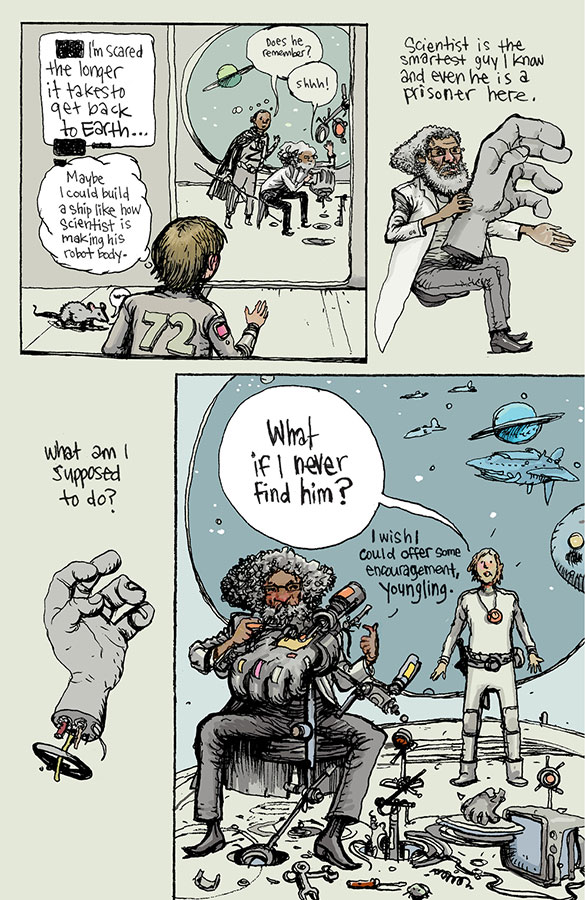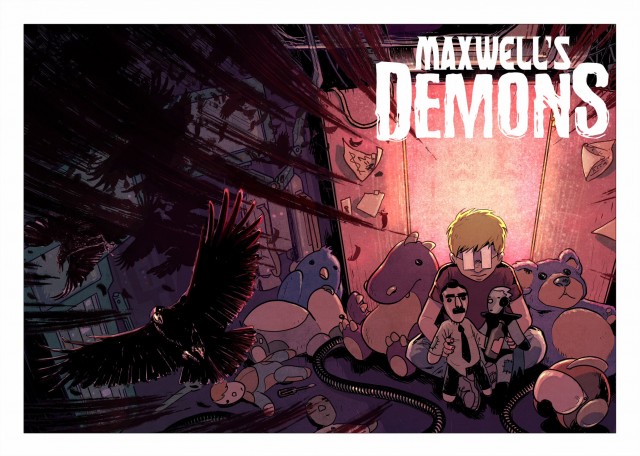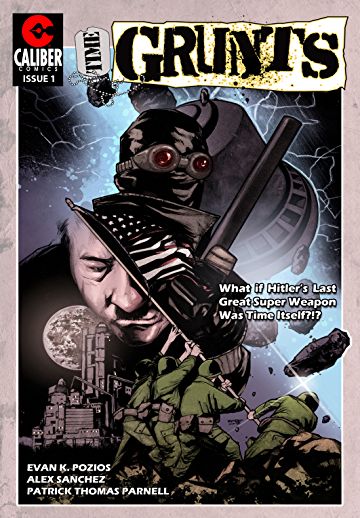June 2018 New Comic Discoveries: How Does it Feel?
By Zack Quaintance — I recently finished a comic, set it down, and stared into space, wondering, What just happened to me? This comic was Proxima Centauri #1 by writer/artist Farel Dalrymple. Ask about plot, and I’ll give you a few dozen boring words about a kid in a sci-fi reality trying to escape...to earth...maybe? Ask how this comic made me feel, however, and I’ll have many specific things to say, some of which might even be interesting (shocker!).
This sounds trite (I know), but in reading the three new-to-me comics on our Top New Discoveries List for June, I was struck by how these great books dealt so heavily in feelings. It was actually one of the creators that first put the thought in my head: Deniz Camp, writer of Maxwell’s Demons. Someone on Twitter asked for advice about pitching, and Camp said plot is less important than how a book makes readers feel.
Mind blown. For years, I’ve said there is something intangible in all my favorite stories. A comic book, for instance, could have great characterization, impeccable hero’s journey, stunning art—but if it lacks this intangible something, it leaves me cold. Camp’s Tweet and my stunned clarity after Proxima Centauri helped me realize this something is feeeeeeelings...nothing more than feelings.
Obvious? Yes, but still important. With that in mind, let’s look now at my favorite new comics discoveries of June and the feelings they wrought upon me.
1. Proxima Centauri #1 (of 6) by Farel Dalrymple
Proxima Centauri #1 is a madcap romp through the feelings of a young boy, deploying sci-fi tropes freely and filtering them through writer/artist Farel Dalrymple’s frenetic artwork and witty dialogue/captioning. There is a pressing concern—the boy is one of a scant few confined to some realm many light years from earth—but moreover, this is to me a book about puberty.
Put simply, the angsty protagonist in Proxima Centauri talks, acts, and glowers in a way that captures what it felt like to go through puberty, to be at once a child and a newly-awakening adult—and to hate it. He’s holding onto childlike creativity while crushing on a character who lacks a corporeal form, before stomping off in a huff when intimacy is more fraught than he expected.
These feelings are all rendered in the book, catapulting us through what amounts to a fairly quick yet packed read. The strongest feeling (for me, anyway) was one of intense and vicious anxiousness, which is entirely commiserate with my experience with puberty. Everything is amazing and full of wonder; everything is also awful. The narrator feels at once like he’s on a thrilling adventure yet alone, watching earth from afar. If only he could do as advised and meditate, slow down, enjoy being in this moment. It will all seem so quaint in just a few years. Take it from me, I'm now wiser. And with my (relative) wisdom, I highly recommend this comic.
2. Maxwell’s Demons #1 - #3 by Deniz Camp, Vittorio Astone, & Aditya Bidikar
Maxwell’s Demons is a powerhouse of a literary comic book, dense with top-tier writing and artwork. The vast majority of its first three issues is dedicated to sci-fi adventure in another realm that our protagonist—a genius little boy living with his surly single father—accesses via complex technology of his own design and a portal in his room.
In some ways, the plot feels well-worn. An alienated-but-brilliant kid escapes dour life through adventure. But Camp’s scripting subverts expectations in two ways: first by making our hero a literary geek who names companions after Greek thinkers (not even ones you’d guess) while quoting Shakespeare, rather than a pop culture obsessed protonerd; and second by giving the alcoholic, abusive father many quiet character moments that make him three dimensional, a stark contrast to other special teen stories that thoroughly flatten similar figures (Harry Potter, Matilda, etc.).
The real strength of this book, though, is how it makes readers feel (our motif!), at once melancholic and empowered. Maxwell in many ways has agency, gamely tolerating his father as he calmly attends to more important business alone. This makes his adventure more meaningful, more significant than if he were exploring just another throwaway realm seemingly designed for him to be a hero. It’s instead a layered romp through a complex boy’s dense subconscious. To put it all in perspective: this is a comic I suggest to friends who enjoy both graphic novels and literary fiction. So far, they've all loved it.
3. Time Grunts Chapter One by Evan K. Pozios, Alex Sanchez, & Patrick Thomas Parnell
Our third and final entry this month is Time Grunts, an old school comic adventure tale from Evan K. Pozios, Alex Sanchez, and Patrick Thomas Parnell that spans from Germany in World War II to Detroit, Mich. today.
Time Grunts is the type of indie comics that makes you happy you’ve read it but upset you don’t have more time to seek out work of similarly-high quality. The plot is B movie-esque, involving time travel (as the name suggests), secret missions, a Dirty Dozen military squad, and nazis. While the craftsmanship is apparent from its start, both in terms of the sharp writing and impressive art, the plot is also tight and well-constructed.
The thing I enjoyed most about Time Grunts, however, was (once more) how it made me feel. Although at times it threatens us with a different outcome for World War II, Time Grunts made me feel as all the best adventure stories do—optimistic.The stakes are high, but in the end I'm certain good will triumph. It’s a great story for 2018.
Time Grunts is available here.
Zack Quaintance is a journalist who also writes fiction and makes comics. Find him on Twitter at @zackquaintance. He lives in Sacramento, California.




